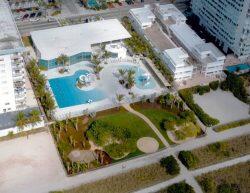A proposed land swap with the town of Surfside to create a memorial on the Champlain Towers South site, where 98 people died, is emerging as a possibility.
The option, discussed during a court conference on Wednesday, would involve swapping the oceanfront lot where the majority of the 12-story Champlain Towers South toppled, with a nearby, similarly sized property also fronting the beach but owned by the town of Surfside.
As suggested by a group who lost loved ones in the collapse, it would call for the town to sell its community center to a developer who otherwise would have built on the Champlain lot. In exchange, Surfside would take over the Champlain lot where it would create a memorial and build a new community center.
The current Surfside Community Center at 9301 Collins Avenue is 0.6 miles north of the collapse site at 8777 Collins Avenue. According to property records, the community center measures nearly 1.4 acres. The collapse site spans nearly 1.9 acres, although a proposed town zoning overhaul would only allow residential development on a portion of it.

Surfside Community Center
“Many of us who have lost our relatives to this would like to see a memorial right on the site,” said Mauricio Kaufman, who lost his parents in the Champlain tragedy. “I understand this is difficult, but all I am asking is that we do some research on this option.”
The Champlain Towers South property is already on the market and generating interest from developers. But the judge overseeing the litigation said the land swap still is a viable option.
“If I approve a contract on the Champlain site and this land swap would occur, then I would simply give the buyer the option to swap the land or cancel the contract,” Miami-Dade Circuit Judge Michael Hanzman said at the conference.
Hanzman directed receiver Michael Goldberg, appointed by the court to oversee the Champlain association’s financial and other matters, to explore the land swap option with the town.
“I have always said from the beginning that no viable option would not be vetted,” Hanzman said.
He cautioned that the land swap in theory is a “win-win,” but its practicality depends on whether the town is amenable. Still, this was the first time the judge indicated that he is open to a memorial on the Champlain site, as it still would allow for disbursements to victims generated by a sale of a development site.
Hanzman so far had argued that in light of a mere $49 million identified in Champlain building and liability insurance, the land had to be sold in order to generate higher payouts to survivors who lost their homes and families who lost loved ones.
The future zoning of the site is still an issue for the sale of the property, which officially hit the market earlier this week. A team led by Avison Young broker Michael Fay is marketing the property, while Fay negotiates a contract with the undisclosed stalking horse bidder. The bidder set the minimum price at $120 million.
“We are getting closer, with terms being agreed upon for court approval and receiver approval,” Fay said. Any sale of the property will be subject to court approval.
Hanzman cited the delicate balance between compensating victims with as much money as possible, and doing it as quickly as possible. A number of survivors are living month to month, in need of relief that could come from the sale. Best case scenario, a closing could occur by the end of this year, he said.
The offering memorandum released this week had been delayed due to ambiguity surrounding the zoning. The controversy is over the size of the lot that can be developed with a residential tower. A potential rezoning could reduce the measurement and density of the property, thus reducing the value.
Although the offering memorandum cites the entirety of the nearly 1.9-acre site, the proposed zoning overhaul would only allow about 1.3 acres to be developed with a high-rise. That means 139 residential units could be built, as opposed to 205 units under the larger measurement. The height is capped at 12 stories.
Hanzman pressed the town’s attorneys on whether Surfside is still pursuing a potential downzoning. “Is the town, given the tragedy that occured here, still contemplating that density change that would reduce height to this property? Is that still under consideration?” the judge asked.
Surfside lawyer Tony Recio said that he would have an answer for the judge after a town zoning workshop on Sept. 9.
The town and the receiver’s attorney, Paul Singerman, also squabbled over Surfside’s emergency access to the property once Miami-Dade turns it over to the receiver. Surfside may be named as a defendant in litigation over the collapse.
Surfside representatives said the town should have immediate access to the site in case of a life-safety emergency, but Hanzman said it “seems like a turf war,” and asked for hypothetical situations where Surfside would have a problem with access.
Survivors and family members said in the Zoom chat that Surfside was “working against victims,” and implied that the town could “eliminate or corrupt evidence” if it had access to the property.
Land swap proponents said that replacing the Champlain site with a high-rise would be difficult to see, and argued the community center might yield a higher sale price.
David Rodan, who lost family members in the collapse, said many buyers won’t want to purchase and live in condos on the Champlain property, calling it a “burial site.”
